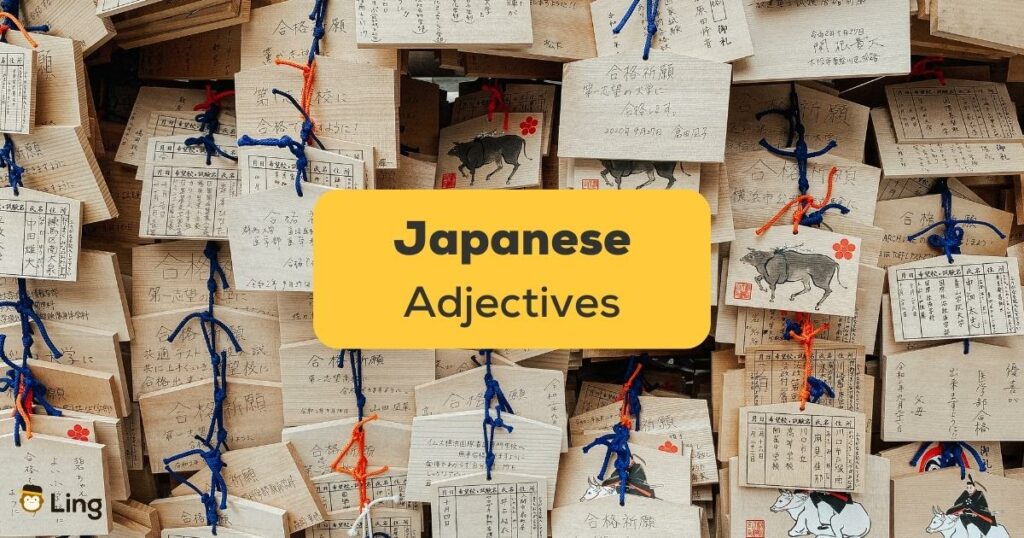If you want to describe your surroundings or convey your feelings to your Japanese friends, you’ll need to learn some Japanese adjectives.
This means you should study many common Japanese adjectives and learn to use each different type in daily conversations. As a first step, we’ll discuss the different adjective categories in Japanese.
Are you curious about learning Japanese? If you want to know more, stay on reading!
What Are The 2 Types Of Japanese Adjectives?
Japanese adjectives are just as essential to learning as Japanese verbs. While describing what you’re doing is one option, there will inevitably come a time when you want to talk about how you feel in Japanese or the weather with your mates.
There are two primary types of adjectives in Japanese: an “I” adjective and a “na” adjective. However, we will include loanwords often used in Japanese, so it is necessary to know where each one fits.
“Na” Adjectives
This adjective usually ends in い (i) when い (i) is the last spelling in the kanji reading.
For example, the word 丁寧 (teinei), which means polite in English, ends in “i.”
In this word, い (i) is part of the pronunciation of the kanji, but we do not add the hiragana letter at the end.
“i” Adjectives
It requires adding an い (i) to the kanji reading. For example, 高い (takai), which means tall in English, also ends in “i.”
Opposed to the previous adjective, in this case, we do add the hiragana い (i) after the kanji.
This is called 送り仮名 (okurigana), a phrase that can be translated to kana written after a kanji to complete the entire reading of the word.
Loanword Adjectives
When you see adjectives written in katakana, it’s a word loaned from English, and they’re usually na adjectives.
For example, ドライ (dorai) is equivalent to “dry” in English.
Let’s see common adjectives in Japanese below!

Common い – I Adjectives
If you’re looking for a quick way to tell if an adjective is Japanese, go no further than this list of い or i adjectives. “i adjectives” are used often throughout the Japanese lesson since they’re so common in this language.
Therefore, we will cover the most frequent Japanese adjectives here.
Also, before you try writing these words down on your notebook or sticky note, there’s a faster way of learning this vocabulary list. Download the Ling app from the Google Play Store and Apple App Store now, and prepare to be fluent in Japanese soon!

Common な – Na Adjectives
You should have fun with “i adjectives” if you figure out that every adjective ending in い (i) belongs in the same list.
But, unfortunately, it’s not always right; some adjectives with a final い (i) are instead “na adjectives.”
Yes, there’s a rule! But also many exceptions that may confuse Japanese learners. Don’t be intimidated; you will get familiar with the practice.
So, to avoid misunderstanding and wrongly performing a structure, let’s look at some commonly used na adjectives.
Adjectives In Japanese Sentence Structure
Let’s show your best command of Japanese grammar by constructing a correct Japanese adjective in the sentence.
If you’ve been studying Japanese for a while, you’ve probably realized that Japanese verbs and adjectives need to change the word form regarding present or past tense and even a negative form. Similar to when we change the form of English adjectives and verbs.
So, to construct correct Japanese sentences, you must remember and practice forming Japanese words. We’ll give you some examples here.
Conjugation Of な Adjectives
Let’s look at “na adjectives.” Using a na adjective may not need changing the word to fit the tense or negative form. While an example is provided below, practice and memory are still required.
Conjugate with a Japanese noun: 有名な
Present tense: 有名です
Present-negative form: 有名じゃない
Past tense: 有名だった
Past-negative form: 有名じゃ なか っ た
Conjugation Of い Adjectives
I adjectives can be altered by omitting the final hiragana い (i) before being conjugated into a new tense or form.
Present tense: うれしいです
Present-negative form: うれしくない
Past tense: うれしかった
Past-negative form: うれしくなか っ た
Have You Learned More Japanese Adjectives Today?
As you can see, constructing a sentence in Japanese requires basic familiarity with grammatical categories and the ability to modify the form of individual words like na adjectives and i adjectives into past tense and negative forms accordingly.
Meaning, the sentence construction can be off from what you intended if you can’t compose Japanese adjectives appropriately.
Knowing a wide range of Japanese adjectives can help you speak with the native much more fluently.
Looking to improve your Japanese vocabulary? We have the perfect app for you!
Learn Japanese With The Ling App
The Ling app offers a massive list of Japanese vocabulary, including nouns, verbs, adjectival nouns, and adjectives.
Get smarter with us through entertaining lessons, including puzzles, games, and a chatbot.
Most Japanese learners chose Ling to help them succeed, so why not join them?


































































